By Joe Padilla
One of the ongoing challenges church pastors and lay-leaders face today are the mental health issues and illnesses affecting individuals and families. Why? Because research reveals that 1 in 5 adults and 1 in 5 children in a given year deal with mental illness. In addition, mental disorders are twice as frequent among the poor and low-income communities which tend to have higher risk factors for severe mental illness. Overall, about 25% of people in need of mental health support first seek help from the church before going to a mental health or medical professional.
It is confusing for church leaders because these problems are disguised as a personal problem, family crisis, divorce, financial challenges, addiction, etc. Congregants are coming to their clergy asking for spiritual guidance on these kinds of issues. The pastor has a huge heart and is willing to help but can be quickly overwhelmed, not knowing how to recognize a mental health challenge, or knowing the mental health resources for more help.
The church is a gateway to mental health needs and can have the necessary tools to respond with simple and adequate support. Thankfully, all the resources are available and can be incorporated TODAY!
The Latino Mental Health Coalition (LMHC) is a collaboration of both Christian and community mental health organizations that can make mental illness a topic and solution of living hope!
On August 13, the Latino Mental Health Coalition will be hosting a FREE conference for Latino clergy and congregants to discover new insights, the available resources, and upcoming trainings for your congregation.
The conference will consist of:
- Free continental breakfast
- Short Keynote presentation from someone with a mental illness and has hope
- Workshops on suicide prevention, youth & mental health, hispanic culture perceptions and more
- Ending with a panel discussion with church leaders addressing new mental health support
Many groups will be represented for all the resources you need to know!
Share and pass this on to many in your church and community … hope is here!
Here are the details…
Mental Health: Tools for the Church
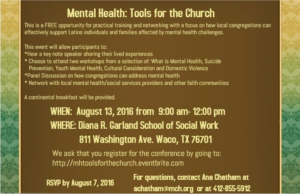 This is a FREE opportunity for practical training and networking with a focus on how local congregations can effectively support Latino individuals and families affected by mental health challenges. Detailed agenda and list of speakers will be available soon. Please RSVP by August 7, 2016. For questions, please contact Ana Chatham at [email protected] or at (412) 855-5912. It is not necessary to print your ticket.
This is a FREE opportunity for practical training and networking with a focus on how local congregations can effectively support Latino individuals and families affected by mental health challenges. Detailed agenda and list of speakers will be available soon. Please RSVP by August 7, 2016. For questions, please contact Ana Chatham at [email protected] or at (412) 855-5912. It is not necessary to print your ticket.
When:
Saturday, August 13, 2016 from 9:00 AM to 12:00 PM (CDT)
Where:
Diana R. Garland School of Social Work – 811 Washington Ave, Waco, TX 76701
Registration:
We are asking that you register for the Conference by going to the EventBrite RSVP site at http://mhtoolsforthechurch.eventbrite.com
Don’t worry if you are unable to register at the site-just let Ana Chatham or Dennis Myers know that you are planning on attending. Also, if you have questions about the conference, please feel free to contact one of us.
 Joe Padilla is a Baylor University graduate and is a licensed and ordained minister who has extensive ministry and non-profit development work in Asia, Africa, Europe, and in the U.S. Currently, Joe is the co-Founder and CEO of Mental Health Grace Alliance an international mental health recovery support organization providing programs and training for those affected by mental illness and for clergy and community leaders. MHGA is an organization that came from Joe’s extensive research in clinical and biblical mental health views and helping his wife have long lasting mental health recovery. Joe and Dr. Matthew Stanford (neuroscience and psychology) founded in Mental Health Grace Alliance in 2010 and has grown to both a national and international impact.
Joe Padilla is a Baylor University graduate and is a licensed and ordained minister who has extensive ministry and non-profit development work in Asia, Africa, Europe, and in the U.S. Currently, Joe is the co-Founder and CEO of Mental Health Grace Alliance an international mental health recovery support organization providing programs and training for those affected by mental illness and for clergy and community leaders. MHGA is an organization that came from Joe’s extensive research in clinical and biblical mental health views and helping his wife have long lasting mental health recovery. Joe and Dr. Matthew Stanford (neuroscience and psychology) founded in Mental Health Grace Alliance in 2010 and has grown to both a national and international impact.
The Act Locally Waco blog publishes posts with a connection to these aspirations for Waco. If you are interested in writing for the Act Locally Waco Blog, please email [email protected] for more information.
By David Shleicher
Note: These were David Schleicher’s remarks for a graveside service for a relative that died an untimely death after years of struggling with bipolar illness. Names have been changed for the sake of privacy. These were first posted in TheContranym.com. – ABT
Even after a hundred thousand years, and knowing it happens to every single one of us, we are still not used to death.
On top of that, like few other things can, the death of children before their parents makes us feel like the universe is out of order, that chaos controls our fate, and that we dare not hope for a better future. I have lost a cousin under similar circumstances.
For Cindy’s service today, our mutual relative Rebecca told me she would not be here. You may not know this, but Rebecca is bi-polar. She said I could explain there was simply too much risk this would throw her into a depression.
For similar reasons I have requested that Michelle in my family, who also is bipolar, arrive just after the service. Or if she gets here while it is still going on, to stand where I cannot see her, because of the risk of my breaking down at the thought of her possibly coming to the same end.
Rebecca has described her own struggle to me as always having a little man in the back of her head, trying to persuade her that she is not loved, that the universe would be better off without her, and that there is only one way to end the pain.
In dark times, she says he is shouting this so loudly he is very difficult to disobey. In good times, he still says it, but she is able to tell him he is a liar and let him fade into the background.
In good times, there are few people more fun to be around than someone like Rebecca, Michelle, or Cindy. In bad times, the hybrid of depression and irritability drives others away when help is most needed.
We know enough now about neuroscience and the personal lives of the famous to be aware that it is often the most special among us that suffer from such conditions. Robin Williams comes to mind.
Looking through Cindy’s photo and memory album today, we were reminded of what a bright, beautiful, and shining light she was. I am passing around her physician father’s favorite photo of her: the very young Cindy examining her infant brother with a stethoscope.
She kept a note from a high school admirer who wrote, “Cindy—well you graduated. You think you’re bad and all. Well I’m here to tell you that you are…” Further down he added, “Even if you drop me like a football or even a baseball, I will always remember you. I reckon you are kinda hard to forget.”
Another page of mementos reminds us of her love for Gone with the Wind, of Godiva Chocolate, and an Eddie Money concert she attended while in high school.
We know these days that it is no surprise that in families that face such difficulties as we face today, one also might find a gifted opera singer (like him over there). Or an over-achieving medical researcher (like him there).
Cindy was accomplished whether on the tennis court, running cross country, or in the classroom as a member of the National Honor Society. Artistic and creative, she was rarely in need of inspiration for her designs and watercolor and acrylic creations. When she wore shoes from two different pairs at the same time, she would leave others wondering what new trend they were missing out on rather than if she knew what she was doing. Whether as a high school homecoming queen nominee or as a TriDelt at her alma mater, others were drawn to her sparkle.
It is a shared belief among most religions that humans are not up to the job, that left to our own devices we are broken, imperfect, and inadequate. In the lyrics of American saint Willie Nelson, “I may not be normal, but nobody is.” It is no coincidence that we live in political climate in which the only thing we all still agree on is that the other side’s candidate is incompetent, a moral failure, and far too irrational to lead us.
No matter how much brokenness and loss we see around us, the loss of life in today’s circumstances can make for a poison that is toxic to our happiness, mixing feelings of grief, guilt, anger, shame, relief for the end of another’s suffering, guilt for feeling relief, and incessant voices in our heads demanding to know “Why didn’t you…”, “What if we had…”, “If only someone…”, and “Why me…why us…why her?”
There is nothing that can be undone and life is just unfair enough that even if everything everyone’s brain is saying could have been done differently actually had been done differently, we very well could be here at this same place, this same day, or perhaps even have been here years earlier.
We cannot go back. The little man in our head that would try to take us backward to re-live, to ask what if, and why not–he is a liar and has no solutions or answers to offer. It’s ok to tell him to shut up.
What about God? Those who give God credit for all the good in their lives at times like these naturally may blame God for the heartache as well. Whether one follows the God of the Old Testament–who still considered David his favorite in spite of their arguments–or the God of the New Testament who withstood Jesus’ doubts and second-guessing in the Garden of Gethsemane, your God can take it.
You would not be the first to question, to doubt, even to curse God, and certainly not the last. Millions have before and millions will in the future, without any likelihood that God is surprised that people in loss are so angry and without any risk that God is going to run away to avoid having to hear it.
Others who do not view the world through the lens of a Creator God may be equally disenchanted and disheartened, but have no direction in which to channel their anger. They may despair that “it is what it is.” That there is no better way, no better place, no room for grace…
As we grieve the loss of Cindy today, look around. Someone else here may be the next person taken from us sooner than we planned, sooner than expected, before we have had time to say the healing things we wanted to say, to put petty slights behind us and move forward.
In the end–whether a believer, agnostic, or atheist–it is all we really can do: look forward. Taking with us the memories that are happy, but leaving in this place all second-guessing. Whether of ourselves or others.
When the little man in our head begs us to follow him back down the perilous path of what might have been, tell him simply, “It is finished.”
Our time on this planet is a limited one and it grows more limited by the minute.
As British saints Paul and John cautioned us in their lyrics, “Life is very short and there’s no time for fussing and fighting my friend.” All we can do and what we must do is channel our grief, our anger, and all the other emotions, into creating more love among those that remain.
Find a friend or family member with whom we nurse some grudge or bear some resentment, or whose Facebook posts drive us absolutely insane, and nonetheless choose to love them and be loved by them. In all our glorious imperfection.
It drives that despicable little man in our head absolutely crazy. Which is ok.
The 46th Psalm:
God is our hope and strength, a very present help in trouble. Therefore will we not fear, though the earth be moved, and though the hills be carried into the midst of the sea;
Though the waters thereof rage and swell, and though the mountains shake at the tempest of the same.
There is a river, the streams whereof make glad the city of God, the holy place of the tabernacle of the Most Highest. God is in the midst of her, therefore shall she not be removed; God shall help her, and that right early.
Be still then, and know that I am God; I will be exalted among the nations, and I will be exalted in the earth.
The LORD of hosts is with us; the God of Jacob is our refuge.
LET US PRAY:
GOD, whose days are without end, we are reminded of the shortness and uncertainty of life, deeply grieved by the loss of dear, precious Cindy.
We are angry that we have lost her so soon, at how much she suffered, and fear we will be forever scarred by our helplessness in the face of it all.
Grant us and Cindy that peace and rest that so often has escaped us. Rescue us from the might-have-beens, the should haves, and what ifs that threaten to entangle us and keep us drowned in grief.
Give us the strength to tell that detestable naysayer in the back of our brains to sit down and shut up.
Perhaps most difficult of all, we ask your assistance in turning our swords into plowshares, in fashioning grief that is a lump of coal, or worse, into a diamond–of greater love and friendship for those of us who remain.
Give us the humility and strength to embrace those around us with all the faults we know all too well they have, in the hope that friends and family can likewise hold their noses and embrace us in spite of what failed, unreliable, quirky, and impatient creatures they know us to be.
God of mercies and giver of comfort: deal graciously, we pray, with all those who mourn, that casting every care on you, they may know the consolation of your love.
Show us light in this great darkness, lead us to hope though we may swear that none exists, and grant us the peace that passes understanding that we may share it with others suffering around us.
Amen.
 David Schleicher is an attorney who lives in Waco.
David Schleicher is an attorney who lives in Waco.
The Act Locally Waco blog publishes posts with a connection to these aspirations for Waco. If you are interested in writing for the Act Locally Waco Blog, please email [email protected] for more information.
By Dr. Emma Wood
Humans need touch. I was reminded of this recently while listening to a podcast in which a woman shared about her partners’ struggle with cancer treatment. The treatment caused touch to be unbearable for her partner, and in turn caused her a different kind of pain- the absence of touch. She shared that she would often leave the hospital and get a manicure just so that she could be touched by someone.
This story, poignant in many ways, reminded me of the necessity of touch. Most people fall on a spectrum of interacting with touch. Some people are “touchy feely” types who hug everyone they meet. This does not describe me, but I do enjoy being friends with those sorts of people. You can always expect a warm embrace when meeting at common grounds or Cameron Park. Other people only like touch when it is offered by a loved one, or a partner, and a handshake or high five is sufficient for their day to day interactions. Most of us probably fall somewhere on a spectrum between these two people. But all of us have in our human DNA the need for physical touch.
I remember during my first semester at college feeling starved for physical touch. I was 7 hours away from home and knew no one. Relationships take time to build and discovering how touch will be received by a new friend is always a bit of a risk. Eventually I found my friend group, some of whom were compatible with me in terms of physical affection, but it wasn’t until my sister joined me at college that I really felt a secure sense of physical comfort.
The touch I am talking about is clearly non-sexual in nature. It is about nurturing, sensing, conveying compassion and acknowledging our physical selves. The mind-body connection is a significant pathway. If you have taken Psychology 101 you might have heard about Harry Harlow’s Monkeys, who chose a fake furry mother to get comfort over a wire mother that provided milk. The monkeys chose physical connection over sustenance; Harlow concluded that “contact comfort” was essential to the psychological development and health of infant monkeys. There have also been studies that show infants that are not touched often display developmental delays and often develop life-long relational deficits that prevent them from feeling intimacy in relationships. Other studies have shown that absence of touch in infants may account for failure to thrive and even death.
The importance of touch to emotional health and wellness has also been well established with research showing that touch triggers the release of oxytocin, a hormone that decreases stress-related responses. Additionally stimulating touch receptors under the skin can lower blood pressure and cortisol levels, effectively reducing stress.
Being mindful of your need for touch can be an important piece in your mental health repertoire. It can come free in the form of hand holding, pats on the back, hugs, and casual touch in our relationships. Another wonderful tool, as mentioned at the beginning of this blog is a professional service.
Massage is one of the healthiest things an individuals can do to improve the wellness of their mind-body connection. I know that often massage is a luxury one may struggle to afford, but what differentiates the expense from other ways we spend money is that it has lasting effects for our physical and emotional wellness. Getting a massage causes muscles to unclench, a racing heart rate to slow, heightened blood pressure to fall, and levels of the stress hormone cortisol to drop. In that relaxed state, your body is able to regroup and recharge. Additionally massage can help to create a more robust immune system. Knowing what the research shows it is clear that massage is not just good for our muscles; it’s good for our entire physical and mental health.
Michelangelo said “To touch can be to give life.” Act Locally Waco and LaBella Visage want to help you reduce your stress and increase your mind-body health by offering readers 20% off massage services for the month of July. When you book use coupon code ACTLOCALLYWACO20.
Whether through massage or the hug of a dear friend, make sure you get your vitamin T this summer.
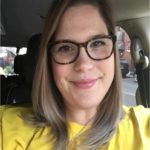 Dr. Emma Wood is a licensed clinical psychologist, public speaker, trainer, consultant and blogger in Waco. You can see more of her work and get more information about the services she provides at www.dremmajwood.com
Dr. Emma Wood is a licensed clinical psychologist, public speaker, trainer, consultant and blogger in Waco. You can see more of her work and get more information about the services she provides at www.dremmajwood.com
The Act Locally Waco blog publishes posts with a connection to these aspirations for Waco. If you are interested in writing for the Act Locally Waco Blog, please email [email protected] for more information.
by Dr. Emma Wood
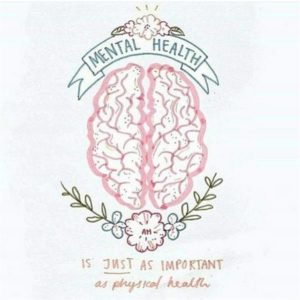 We live in a culture that values productivity over health, outward validation above personal contentment, the bottom line (usually money) over the complex and at times painful beauty of being human. Within this culture, physical health is acknowledged as legitimate while mental health seems to be considered a “personal problem” or at best optional.
We live in a culture that values productivity over health, outward validation above personal contentment, the bottom line (usually money) over the complex and at times painful beauty of being human. Within this culture, physical health is acknowledged as legitimate while mental health seems to be considered a “personal problem” or at best optional.
You broke your leg? Let me take you to the ER!
You can’t get out of bed in the morning because life is overwhelming? Just try harder, or drink coffee, or… maybe you are just lazy.
Around 25 % of America’s population experiences a diagnoseable mental illness in a given year. You may or may not fall into that 25%, but mental health is an issue for 100% of the population. An absence of mental illness does not the presence of mental health make. As a clinical psychologist I see the negative impact of the denial of mental health as a priority. Often, when people chronically neglect their mental health and self-care they ultimately end up with depression or anxiety which interferes with their ability to function.
The World Health Association defines mental health this way:
“Mental health is a state of well-being in which the individual realizes his or her own abilities, can cope with the normal stresses of life, can work productively and fruitfully and is able to make a contribution to his or her community.”[1]
I would encourage you to ask yourself a question: where am I at with mental health?
 Being a therapist does not make someone immune from emotional and psychological difficulties, just as being a physician does not make you immune to cancer. All human beings are vulnerable to stress and ultimately distress. There are many ways one can improve or work on their mental health. Regular exercise that is fun (i.e. not pounding away on a treadmill looking at a wall), self-reflection, opportunities for creativity, play, relaxation, reading, meaningful relationships, eating delicious and nutritious food, these can all be part of your mental health routine. My routine is admittedly not as robust as I would like it to be. With two toddlers, a full time job, root canals, ear infections, church pot lucks, evening programs, etc. I find it hard to get it right. This is where the pièce de résistance of self-care comes in. The “mental health day.” The mental health day is a sick day off work or away from parenting (i.e. a babysitter). Consider it if mental health is sliding down the slippery slope towards mental illness.
Being a therapist does not make someone immune from emotional and psychological difficulties, just as being a physician does not make you immune to cancer. All human beings are vulnerable to stress and ultimately distress. There are many ways one can improve or work on their mental health. Regular exercise that is fun (i.e. not pounding away on a treadmill looking at a wall), self-reflection, opportunities for creativity, play, relaxation, reading, meaningful relationships, eating delicious and nutritious food, these can all be part of your mental health routine. My routine is admittedly not as robust as I would like it to be. With two toddlers, a full time job, root canals, ear infections, church pot lucks, evening programs, etc. I find it hard to get it right. This is where the pièce de résistance of self-care comes in. The “mental health day.” The mental health day is a sick day off work or away from parenting (i.e. a babysitter). Consider it if mental health is sliding down the slippery slope towards mental illness.
I have come up with some hopefully helpful guidelines should you need and use a mental health day. I encourage you to do this, perhaps once a year, or more if necessary. Hopefully the following sentiments will assist you in getting the most out of your mental health day.
Things not to do on your mental health day:
 Laundry
Laundry- Clean the kitchen (or any other part of the house)
- Wear restrictive clothing
- Answer work emails
- Run errands
Things to avoid:
Picking up your children early from day care/school- it’s good to miss them. Ignore the guilt about not spending time with them. If you take the day for you, for the few hours you get with them at the end of the day you will be a much more present and healthy parent.
Avoid productivity. This is probably the most counter cultural message, but it is important to have time to live, play, relax, be in the moment.
Avoid that list of things that you want to get done when you have time. Taking the new Mom a meal, buying new shoes for your baby’s rapidly growing feet, meal planning and prepping, working on the taxes, mowing the lawn, etc. you are booked all day with an appointment with yourself- you can’t cancel on him/her again!
Avoid guilt- easier said than done.
Things TO DO on your mental health day:
Nourish your soul. There is a qualitative difference between binge watching Netflix and reading an inspiring autobiography. There is a difference between watching day time tv and watching a nostalgic comedy from your childhood. Think about what the junk food of your brain is- it’s a quick distraction but leaves you feeling empty and hungry. Start to figure out the things that fill you up.
Journal. Take some time and space to think, clarify your thoughts and values, tune in to your inner experience. This is probably the healthiest thing you can do on your mental health sick day.
Have your partner bring home dinner. Let yourself completely off the hook- don’t cheat yourself out of the full day. It’s like meticulously planting a garden, and then not watering it. You want to follow through to see the full results of your investment.
Hopefully these tips leave you inspired and motivated to making mental health a priority!
 Dr. Emma Wood is a licensed clinical psychologist, public speaker, trainer, consultant and blogger in Waco. You can see more of her work and get more information about the services she provides at www.dremmajwood.com
Dr. Emma Wood is a licensed clinical psychologist, public speaker, trainer, consultant and blogger in Waco. You can see more of her work and get more information about the services she provides at www.dremmajwood.com
The Act Locally Waco blog publishes posts with a connection to these aspirations for Waco. If you are interested in writing for the Act Locally Waco Blog, please email [email protected] for more information.
References:
[1] World Health Organization [WHO]. “Strengthening mental health promotion (Fact Sheet No. 220.),” www.who.int/mediacentre/factsheets/fs220/en (accessed January 6, 2010).
By Jennifer Alumbaugh, LMFT
I’ve had a few, what I like to call “Job years” in my life, those seasons when the hits just keep on coming and I’ve barely recovered my breath from one loss while I’m learning of the next one.
I had my first Job year when I was 8/9: my parents got divorced, my favorite kindred Aunt passed away, my childhood best friends and neighbors moved away, I moved to a new city and school, and my mother got remarried. That year—actually, that all occurred within a nine month span—left a lot of gaping holes in my 9 year old soul, and aged me a few decades as well.
I went to a support group for kids who experienced loss of a parent via death or divorce and met a friend with whom I became close and stayed friends over the years through high school and a while beyond. She had lost her father to cancer. We talked about loss and grief and connected over understanding the kinds of things at our age many other kids didn’t.
“Be with those who also are grieving. As you tell your stories, you will share an understanding of the heart that is deeper than words.” –Karen Katafiasz
After college I moved to Texas to be a foster mother at a youth ranch. For the first few months I lived in a staff house and was on a 4-day rotation in a house for middle-school age girls. Six months after I moved my life to Texas, I and a few other staff members lost everything in a fire that consumed our living quarters. It was a different kind of loss—of things, material possessions—no people were hurt or killed in the night time blaze. But it left a scar that I still feel today, when I forget and look for that one shawl my grandmother gave me, or those photos from college, or the first quilt I ever sewed. The Red Cross voucher couldn’t replace those things.
Six months after the fire, I was parenting in another home. This time on my own in a house of eight high school aged girls. The girls had just given me my first Mother’s day that Sunday, complete with wildflowers picked on the walk home from church and grilled cheese lunch they insisted on making me and hand written cards. May 15, 2002. Wednesday. Two of my girls and one of the boys from the other house borrowed a friend’s car, skipped afternoon classes, and drove into town. I was told they were going so fast they died on impact, in an instant. That weekend I buried three children in three days.
Last year, I lost several family relationships including contact with my young nieces and nephew who I came to Waco to help raise during my brother-in-law’s deployment. These bonds were severed due to the effects of my brother-in-law’s Narcissistic abuse and other toxic power and control dynamics among family members.
My life has been marked by some profound circumstances of loss and grief. While there have also been extraordinary joys and life scattered throughout, I began learning early on that there is no returning to the way things were, there is only moving forward, with the pain, to create a new normal.
“There will come a time to remind yourself of your reasons for living. You have a future worth enduring for, and you deserve to find a renewed sense of purpose and pleasure in your life.” –Karen Katafiasz
What that looks like is different for everyone. Around the world various cultures and beliefs have a vibrant array of ritual, ceremony, and celebrations to remember the dead, to honor those who have crossed over before the rest of us. For some, solace is found in spiritual practices and the comfort of faith beliefs and communities. For others, peace is sought in living out legacies of those passed on. Some grieve loudly, with wailing and heaving sobs unbridled. Others sit Shiva, quietly contemplating, in their homes. Some wear the clothes of mourning, muted solemn hues; others don vibrant colors celebrating lives lived, joys relished, with light and music and laughter.
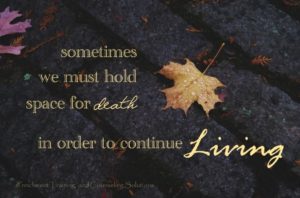 Some losses are private, secret, taboos whispered about in hushed tones and behind closed doors. Some losses are splattered across front-page news, a community outrage, a public nightmare unending. Some losses are respected, others are judged, some are shamed, others are “good-riddanced.” But every loss is someone’s. And I believe we must hold space for death—of a person, a relationship, a dream, a hope, a moment, a creature, an identity—in order to continue living.
Some losses are private, secret, taboos whispered about in hushed tones and behind closed doors. Some losses are splattered across front-page news, a community outrage, a public nightmare unending. Some losses are respected, others are judged, some are shamed, others are “good-riddanced.” But every loss is someone’s. And I believe we must hold space for death—of a person, a relationship, a dream, a hope, a moment, a creature, an identity—in order to continue living.
If you’re like me and you’ve survived a loss or three or many, you’ve also endured the onslaught of usually well-intentioned but so often hurtful sayings and prescriptions shared by those on the outside of our suffering. In retrospect I can appreciate their good intentions, but in the moment, those words strike as swift and deep as arrows and their aching effects can linger for a long while after.
The truth is, there is no right or appropriate way to move through our experiences. The process, as much as our experience, is unique to each of us. What resonates with one, rubs another uncomfortably. What nourishes one, may set back another. There is no timeline, no expiration date, no ordered and linear path out and past grief. We grow familiar with it. Accustomed to the weight and shape of it in our lives. And around this reality, we begin piecing together a new us, a new life, a new rhythm.
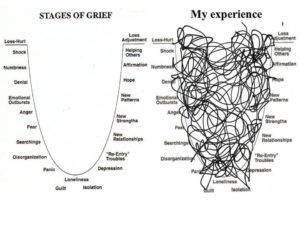 Elizabeth Kübler Ross gave us some language for discussing loss with her classic Five Stages of Grief (denial, anger, bargaining, depression, acceptance), yet many of us—professionally and personally—have come to realize that 1) there are many more than five parts and 2) they seem more like facets or stations at which one may visit multiple times along their journey through loss and grief. Personally, I find myself looking much more like the depiction on the right than any kind of neat, discernable, or graceful movement. (Picture source).
Elizabeth Kübler Ross gave us some language for discussing loss with her classic Five Stages of Grief (denial, anger, bargaining, depression, acceptance), yet many of us—professionally and personally—have come to realize that 1) there are many more than five parts and 2) they seem more like facets or stations at which one may visit multiple times along their journey through loss and grief. Personally, I find myself looking much more like the depiction on the right than any kind of neat, discernable, or graceful movement. (Picture source).
While there is no one formula for expressing grief, there are both healthy and unhelpful ways of coping with our feelings in the wake of loss. As a therapist, life coach, friend, and fellow mourner, I have sat with people of all ages, beliefs, cultures, and backgrounds through some of the darkest moments in life. I’ve sat with myself through them. In my experience, the most harm we can do is to ignore the feelings and to avoid talking about it. I know. It is scary and difficult and painful. Sometimes our losses shake and shatter everything we have come to believe, and in our grieving, we must rebuild what was razed to the ground.
I also know the beauty that can come from sharing the process with others—in therapy, in coaching sessions, in support groups, in creative outlets—we may find that in those moments when we feel we have been left with nothing, our words offer a light and a hope to another. And out of nothing, we find, a resilient something. There can be profound healing in a validating, “me too” of another sitting with us on our mourning bench. If you are finding yourself in this place, whether it is with a pastor, rabbi, elder, priest, counselor, life coach, friend, support group, mentor, therapist, or other trusted ally, I encourage you to seek the companionship of others along your journey through grief, loss, and finding a new normal. It is one path you don’t have to walk alone.
Resources:
- Holding Space – an ongoing, weekly grief and loss support group @ Enrichment Training & Counseling Solutions. Saturdays (March 5th) 10a-11:30am. Includes learning, creative projects, and guided discussion. Facilitated by Jennifer Alumbaugh, MS. Register here.
- GriefShare 12–week groups
- Providence Healthcare Network Support Groups
 Jennifer Alumbaugh, MS is a Licensed Marriage and Family Therapist providing clinical and professional development consultation services at Enrichment Training and Counseling Solutions. She has extensive experience working with adolescent and adult survivors of psychological and spiritual abuse, trauma (sexual violence, childhood trauma, interpersonal violence); and complex PTSD. These, along with grief and loss work are her areas of specialization. Jennifer practiced as a mental health clinician throughout Los Angeles County working with children, youth, and their families from 2007-2012. In Central Texas, Jennifer has worked as a Site Coordinator with Communities in Schools of The Heart of Texas at G.W. Carver Middle School; as an independent consultant and professional development trainer; and conference speaker. In 2016 Jennifer created an implemented a therapeutic creative writing program, Brave Young Voices, at Klaras Center for Families and at the Texas Juvenile Justice Department correctional campus at Mart, TX. She may be reached at: [email protected] or 254-405-2496.
Jennifer Alumbaugh, MS is a Licensed Marriage and Family Therapist providing clinical and professional development consultation services at Enrichment Training and Counseling Solutions. She has extensive experience working with adolescent and adult survivors of psychological and spiritual abuse, trauma (sexual violence, childhood trauma, interpersonal violence); and complex PTSD. These, along with grief and loss work are her areas of specialization. Jennifer practiced as a mental health clinician throughout Los Angeles County working with children, youth, and their families from 2007-2012. In Central Texas, Jennifer has worked as a Site Coordinator with Communities in Schools of The Heart of Texas at G.W. Carver Middle School; as an independent consultant and professional development trainer; and conference speaker. In 2016 Jennifer created an implemented a therapeutic creative writing program, Brave Young Voices, at Klaras Center for Families and at the Texas Juvenile Justice Department correctional campus at Mart, TX. She may be reached at: [email protected] or 254-405-2496.
The Act Locally Waco blog publishes posts with a connection to these Aspirations for Waco. If you are interested in writing for the Act Locally Waco Blog, please email [email protected] for more information.
By Jennifer Alumbaugh, LMFT
“Compassion Fatigue is a state experienced by those helping people or animals in distress; it is an extreme state of tension and preoccupation with the suffering of those being helped to the degree that it can create a secondary traumatic stress for the helper.” ~ Dr. Charles Figley
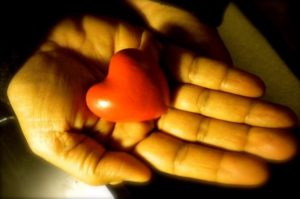 We’ve all had our experiences with being stressed out—feeling overwhelmed at the end of a long day or a trying week full of deadlines and intense interactions with others. Usually a good night’s rest or a day or two off are enough to recuperate from stress. When that stress builds up over time without proper attention, it leads to burnout which thankfully can usually be relieved by a longer span of time off—like a week vacation or holiday break. Compassion fatigue rests on the more intense end of the spectrum of the impact of caring for others. Sometimes known as “vicarious” or “secondary trauma,” it is the most extreme manifestation of stress resulting from exposure to those who are suffering. It is important to note that compassion fatigue may present after sustained exposure or after only a single event.
We’ve all had our experiences with being stressed out—feeling overwhelmed at the end of a long day or a trying week full of deadlines and intense interactions with others. Usually a good night’s rest or a day or two off are enough to recuperate from stress. When that stress builds up over time without proper attention, it leads to burnout which thankfully can usually be relieved by a longer span of time off—like a week vacation or holiday break. Compassion fatigue rests on the more intense end of the spectrum of the impact of caring for others. Sometimes known as “vicarious” or “secondary trauma,” it is the most extreme manifestation of stress resulting from exposure to those who are suffering. It is important to note that compassion fatigue may present after sustained exposure or after only a single event.
In my work providing professional development and support to other professionals in the fields of mental health, social work, medicine, foster care, juvenile justice, family interventions, and community social services I often encounter colleagues who are inclined to underestimate the severity of the effects of compassion fatigue.

There is something so uniquely vulnerable about sitting with children and youth who are hurting, who are suffering.
The general stigma is, “that’s not really an actual thing, and even so, I’ve got it under control.” I know. I thought the same thing for years as I worked as a community mental health clinician in Los Angeles County. For five years I saw children and youth who all had histories of physical, sexual, and/or emotional abuse; exposure to community and gang violence; or had experience in the system as a foster child or in a juvenile corrections facility or sometimes all of the above. When I first learned about compassion fatigue—in depth and as an actual issue complete with symptomatology—I thought I was fine. I had it together. I used the phrase “self-care” frequently to qualify activities in which I engaged. I went to supervision. I debriefed with colleagues. I had it all under control.
But I didn’t.
As I moved through that first compassion fatigue training, I began to connect the dots of what I was experiencing. I completed a self-evaluation and found myself to be off the charts with compassion fatigue and burnout and in subzero territory with barely any restorative assets in sight. I was in dire straits.
 When compassion fatigue hits, we feel it across the landscape of our entire being: cognitive, relational, emotional, spiritual, physical, and behavioral. Just like any other ailment of the mind or body, the symptoms begin to interfere with our normal, everyday functioning. We begin to question not only the meaning of our work, but the existential angst spreads to every area of our lives. Compassion fatigue unchecked has the power to unravel us entirely, even rocking our foundation of our core beliefs. It’s serious. It’s real. It deserves our undivided attention.
When compassion fatigue hits, we feel it across the landscape of our entire being: cognitive, relational, emotional, spiritual, physical, and behavioral. Just like any other ailment of the mind or body, the symptoms begin to interfere with our normal, everyday functioning. We begin to question not only the meaning of our work, but the existential angst spreads to every area of our lives. Compassion fatigue unchecked has the power to unravel us entirely, even rocking our foundation of our core beliefs. It’s serious. It’s real. It deserves our undivided attention.
Thankfully, there is hope. Like with so many other challenges in our lives, awareness and education are vital first steps. Understanding the pervasive scope of compassion fatigue, how we are personally at risk or affected, and what practical steps are necessary to recover and maintain wellness and to prevent future instances.
Most importantly, we need to be kind to ourselves, honoring the truth that it is not a result of our own short-comings that we may experience compassion fatigue. In fact, “The expectation that we can be immersed in suffering and loss daily and not be touched by it is as unrealistic as expecting to be able to walk through water and not get wet,” (Remen, 1996).
 After awareness comes action. It is vital that as professionals we intentionally pursue our own wellness. If experiencing compassion fatigue, a season in personal therapy is strongly recommended to address personal and professional circumstances leading to the secondary traumatization. Additionally working through an assets inventory will help to identify specific areas of life that need a boost in self-care practices, people, and pampering. The process is unique for everyone but it is not optional. As Dr. Charles Figley—expert in the field and Director of the Tulane Traumatology Institute–asserts, “It is unethical to not attend to your self-care as a practitioner, because intentional self-care practice prevents harming those we serve.”
After awareness comes action. It is vital that as professionals we intentionally pursue our own wellness. If experiencing compassion fatigue, a season in personal therapy is strongly recommended to address personal and professional circumstances leading to the secondary traumatization. Additionally working through an assets inventory will help to identify specific areas of life that need a boost in self-care practices, people, and pampering. The process is unique for everyone but it is not optional. As Dr. Charles Figley—expert in the field and Director of the Tulane Traumatology Institute–asserts, “It is unethical to not attend to your self-care as a practitioner, because intentional self-care practice prevents harming those we serve.”
Professionally and personally this time of year is often ripe for stress, burnout, and compassion fatigue. While an in-depth training usually spans several hours of teaching, self-evaluations, discussion, and workshopping self-care plans, I couldn’t leave you without a few quick tips for self-care best practices!
Quick Tips for Self-Care Best Practices:
Helpful hint 1: DO spend time with non-traumatized people (this includes family and friends!) who replenish your empathy, joy, and compassion. – Going out with colleagues after work or at lunch is only replenishing if you instate a “No Talking about Work” rule and hold each other accountable!
Helpful hint 2: Set firm boundaries around the time and space you spend with those who deplete your energy, compassion, and nurturing…yes, even/especially when they are your family and friends. It is difficult, not impossible.
Helpful hint 3: If you feel you must spend time with people who deplete you, plan your visit outside of your home, office, or personal space—go to their home, a restaurant, coffee shop, other public venue. This allows you the freedom to leave on your own schedule, avoiding the awkwardness of guests overstaying their welcome in your space.
Helpful hint 4: Set a specific amount of time for your visit and let them know at the beginning that you’ll need to leave by X time. You don’t need to give an explanation for where or why you need to leave, and you don’t need to contrive elaborate fictions. It may sound something like, “Sure let’s grab coffee, I can meet at 1pm and will need to head out by 2pm.”
Self-Care Challenge: Before the stroke of midnight on December 31, 2015, I challenge you to engage in three (3) activities of at least 1 hour each that serve only you. Meaning, you are the only beneficiary of the activity—be it a massage, a walk along a favorite hiking trail, a small gift for yourself, watching the game with friends, getting a sitter for a night out, engaging in a creative/art outlet, or turning off your electronics and going to bed early—whatever resonates with you, do that thing, guilt-free, and practice radical acts of self-love and care.
 Jennifer Alumbaugh, MS is a Licensed Marriage and Family Therapist providing clinical and professional development consultation services at Enrichment Training and Counseling Solutions. She practiced as a mental health clinician throughout Los Angeles County working with children, youth, and their families from 2007-2012. In Central Texas, Jennifer has worked as a Site Coordinator with Communities in Schools of The Heart of Texas at G.W. Carver Middle School; as an independent consultant and professional development trainer; and conference speaker. In 2016 Jennifer created an implemented a therapeutic creative writing program, Brave Young Voices, at Klaras Center for Families and at the Texas Juvenile Justice Department correctional campus at Mart, TX. Jennifer has extensive experience working with adolescent and adult survivors of psychological and spiritual abuse, trauma (sexual violence, childhood trauma, interpersonal violence); and complex PTSD. These, along with grief and loss work are her areas of specialization. She may be reached at: [email protected] or 254-405-2496.
Jennifer Alumbaugh, MS is a Licensed Marriage and Family Therapist providing clinical and professional development consultation services at Enrichment Training and Counseling Solutions. She practiced as a mental health clinician throughout Los Angeles County working with children, youth, and their families from 2007-2012. In Central Texas, Jennifer has worked as a Site Coordinator with Communities in Schools of The Heart of Texas at G.W. Carver Middle School; as an independent consultant and professional development trainer; and conference speaker. In 2016 Jennifer created an implemented a therapeutic creative writing program, Brave Young Voices, at Klaras Center for Families and at the Texas Juvenile Justice Department correctional campus at Mart, TX. Jennifer has extensive experience working with adolescent and adult survivors of psychological and spiritual abuse, trauma (sexual violence, childhood trauma, interpersonal violence); and complex PTSD. These, along with grief and loss work are her areas of specialization. She may be reached at: [email protected] or 254-405-2496.
The Act Locally Waco blog publishes posts with a connection to these aspirations for Waco. If you are interested in writing for the Act Locally Waco Blog, please email [email protected] for more information.
by C J Wood
Often when people think of treating mental health disorders they think of medicine and therapy. These two things are only part of what is needed for someone to thrive again. Just as with any other disease, recovery includes caring for the body, mind, and spirit. This works best in the context of community.
As someone who has a mental health disorder, the first step towards instability is losing my routine. Going to bed and waking up at the same time, eating healthy meals at regularly scheduled times, and taking my medication on a regular basis all impact my ability to cope with my symptoms. Friends and family can support these habits by understanding their importance. Not giving a person a hard time when they won’t stay out late or eating healthy meals with a person helps them not feel isolated.
Being a gatekeeper is a crucial role for friends and family to play. Being a gatekeeper often looks like a bodyguard. For a spouse, it can mean allowing your partner to take a nap or excusing yourselves from a social function. Friends can also help a friend exit overwhelming situations like needing to leave in the middle of a movie or in the middle of grocery shopping. Being a gatekeeper ultimately means being present and aware. It does not mean making the person a project.
I do not know how I would have made it through a very rough patch without my friend Megan. She was a gatekeeper for me but she also allowed me to reciprocate by supporting her and being present in whatever capacity I could. Often that meant helping put her kids to bed and reading bedtime stories to them. She also knew not to ask me, “Have you been taking your medication?” She identified symptoms and asked about them. She asked open ended questions like “How are you feeling today?” Or stated an observation like “You seem a bit anxious today? What’s going on?” She knew I could have a bad day unrelated to my mental health disorder. Megan also pointed out when I was doing well. I had dinner with her family at least once a week. She offered me community and friendship.
As a person who shared my faith, Megan gave me the space and grace to not attend church. She understood how stress inducing this could be. She did cultivate and encourage opportunities that connected me to my faith community and God outside traditional rituals and expectations.
Community is essential to holistic recovery. It provides the scaffolding of grace, hope, and encouragement to support the other aspects of recovery. It celebrates what a person can do no matter how small like getting out of bed and brushing your teeth. It prevents isolation and can lessen stigma. No one can recover alone.
 C J Wood lives in San Antonio, TX, where she works as a Resident Chaplain for the Baptist Health System. She lived in Waco while attending Truett Seminary where she earned her MDiv. CJ then went on to teach 3rd grade for Waco ISD before moving to India to work as an education consultant. Most recently CJ worked for AVANCE-Waco. She is currently working on her DMin in Formational Counseling from Ashland Theological Seminary in Ohio. She is the proud aunt of 2 nieces and 5 god children. CJ loves her Lhasa Apso Jasmine Rose who she brought back from India.
C J Wood lives in San Antonio, TX, where she works as a Resident Chaplain for the Baptist Health System. She lived in Waco while attending Truett Seminary where she earned her MDiv. CJ then went on to teach 3rd grade for Waco ISD before moving to India to work as an education consultant. Most recently CJ worked for AVANCE-Waco. She is currently working on her DMin in Formational Counseling from Ashland Theological Seminary in Ohio. She is the proud aunt of 2 nieces and 5 god children. CJ loves her Lhasa Apso Jasmine Rose who she brought back from India.
The Act Locally Waco blog publishes posts with a connection to these aspirations for Waco. If you are interested in writing for the Act Locally Waco Blog, please email [email protected] for more information
By Salley Schmid
I am an advocate for people making use of Mental Health Services.
I wish everyone could have the opportunity to speak with a supportive someone who is relatively objective and not tied in any way to the outcome of a person’s decisions. Many people have never gone to counseling so my goal here is to give readers a sense of what counseling is like and why it is worth trying when in emotional or relational distress. I use the analogy of a water fall to describe the counseling process. If you were standing under a pounding waterfall in the gap between the cliff wall and the water careening over the cliff’s upper edge, facing the cliff and pushing against it, trying to create change; this would be that place where you are relatively alone in your emotional pain. Counseling is like turning around and facing the waterfall. Pushing against the cliff was not changing anything. Looking at the waterfall equates with facing the distressing situation and painful emotions. Not hiding your face from it any more. Then through counseling, a hand reaches through the water fall to take your hand and help you step into the waterfall. The waterfall (your emotions) pounding on you is like letting yourself feel and spend time in the painful emotions. You don’t want to feel the pain, but staying stuck under the waterfall is not tolerable either and not helping. And you are stuck. So you step and you feel and you have a hand to hold to help you through, that’s your therapist’s hand. You must be careful walking through the pounding water but it can be done and it is the path out of the intolerable situation. It may take a while to walk through the pounding water and the waterfall will still be there when you emerge stronger on the other side. You now can choose to step back to it, but you are no longer stuck under it.
A therapist can serve many functions. A therapist is there, fully present to listen and understand, encourage, engage, challenge and facilitate digging deep to explore the range of possibilities leading to an individual making a decision for themselves. Therapists teach skills to help people manage distressing situations or thoughts. Therapists facilitate processes to help people push through a difficult time in order to reach the other side with strength and authenticity. Therapists make space for you to purge painful thoughts and emotions, wrestle with the unknown and unwanted, and to both rage and make peace. The therapist’s office and the therapeutic relationship serves as a safe place, a judgment free zone, a place to find and embrace authenticity and to take the risk to live out loud. If you are hurting, show mercy and kindness to yourself, love yourself enough to get help and take that walk through the waterfall…emerging strong and successful on the other side.
 This Act Locally Waco blog post was written by Salley Schmid. Salley is a transplant from Kansas by way of Colorado (where her spirit soars). She also loves Vitamin SEA (YES, as in the ocean not the real vitamin). Salley is the mother of nearly graduated twin daughters and a nearly graduated step son. Can you say almost triplets? Salley has never given birth but is the proud mother of these three. As you can tell, since she is a step mother, she is in a “blended family” and since she has never given birth she is an adoptive mother. Salley has known painful relationships, loss, grief, love, loss of self, finding of self and both searching for and making deep soulful connections. All of her life story informs her work as a therapist as much as her training as a Therapist / Counselor. Salley is trained specifically in Marriage and Family Therapy and in “The Daring Way” work of researcher and author Brene Brown, and Positive Discipline Parenting.
This Act Locally Waco blog post was written by Salley Schmid. Salley is a transplant from Kansas by way of Colorado (where her spirit soars). She also loves Vitamin SEA (YES, as in the ocean not the real vitamin). Salley is the mother of nearly graduated twin daughters and a nearly graduated step son. Can you say almost triplets? Salley has never given birth but is the proud mother of these three. As you can tell, since she is a step mother, she is in a “blended family” and since she has never given birth she is an adoptive mother. Salley has known painful relationships, loss, grief, love, loss of self, finding of self and both searching for and making deep soulful connections. All of her life story informs her work as a therapist as much as her training as a Therapist / Counselor. Salley is trained specifically in Marriage and Family Therapy and in “The Daring Way” work of researcher and author Brene Brown, and Positive Discipline Parenting.
The Act Locally Waco blog publishes posts with a connection to these aspirations for Waco. If you are interested in writing for the Act Locally Waco Blog, please email [email protected] for more information.
By Georgie Price
Three years ago, I began my professional career after college working as a case manager for children and adolescents struggling with mental health or behavioral challenges. I had little idea of what mental health was or how it impacted anyone in the community. I was naïve to the prevalence of mental health issues among youth.
Since then, I have had many experiences open my eyes to the need for help right here in our Waco community. Children and adolescents face a variety of mental health challenges every day, which range from just not being able to get up and go to school, building positive social interactions, to learning how to live and understand mental health and behavioral challenges. Many times family members, teachers and other individuals who interact with this population do not recognize signs and symptoms of mental health concerns, just because they don’t know what to look for. In my experience, this leads to children and adolescents with mental health concerns being seen in a negative light and not receiving the help they need. When just looking at the surface level, we may miss the indicators of a much larger issue, the most prevalent of these issues being anxiety, behavior, mood, and substance use disorders.
The pervasiveness of mental illness in young people can be surprising. For instance, our youth suffer from many disorders including: anxiety disorders at a rate of 31.9%, behavior disorders 19.1%, mood disorders 14.3%, and substance use disorders at 11.4%. Young people that suffer from these disorders are at a higher risk for suicide which, sadly, is the third leading cause of death for young people in the United States. Coming into this profession, I had no idea of the impact mental health was having on our young people but I knew there had to be a way for me to help.
A little over a year ago, I was fortunate enough to be part of a training, to become an instructor for Youth Mental Health First Aid. This program is geared towards educating and certifying community members to provide Mental Health First Aid, empowering them to recognize signs and symptoms of metal health within this population. In my agency, we are able to train a number of people including parents, youth leaders, and any group interested; however, we have geared our efforts towards training those most in contact with youth, which are our educators.
With all of the adversities youth and adolescents face today, it is imperative we differentiate normal teenage behaviors from a mental health concern or crisis. The training is intended for those without background or experience in mental health, and it is very easy to understand. My hope is that the more people within the community are trained, the more successful we all will be at helping our youth and families, as it takes a team to help youth and families achieve the life they desire.
Let me share a story with you: Approximately a year ago, I met a youth and his parent. This youth had a history of assaulting family members and obtaining lethal weapons. CPS was involved and the youth was then on juvenile probation for theft. As we sat down at their kitchen table, the youth would not look or acknowledge me and the parent was suspicious and resistant towards any help I could offer them. I was definitely discouraged, but chose not to give up. I knew I needed a team to help me connect with this family and provide them with as much support as possible. I reached out to the community and gained the alliance of the principal, probation officer, Boy Scout leader, counselor, psychiatrist, and a family partner.
After a couple of months of persistent efforts, all of us showing up at their home, the youth’s school, probation report-ins, wraparound meetings, and connecting them to resources, they began to trust and open up to me. After six months, we are sitting at the same table, and both the youth and parent are engaged and ready for the next task to help them reach the vision they have for the life they want. Anytime there was a setback, it motivated us as a team even more, because this family was not just a family we were helping, they became our family. After a yearlong process of all of us working together, the youth was no longer on probation, making straight A’s in school, no CPS involvement, and home life had improved drastically.
All of these things could not have happened without the help of individuals from the community. No matter what role you play – parent, teacher, pastor, counselor, coach, mentor, and neighbor- you will make an impact on that young person’s life. I encourage everyone to become educated on child and adolescent mental health, whether it is through a program like Youth Mental Health First Aid, or just checking out a book from the library that will better prepare you for interactions with this population. Thankfully, there are many organizations in the Waco community that you can reach out to, but one of the best ways to help our young people is to be become educated on mental health yourself. Your involvement and support in their lives is an invaluable resource we cannot replace.
 This Act Locally Waco blog post was written by Georgie Price. Georgie is a supervisor for a local non-profit that provides mental health services to children and adolescents. She attended Baylor University and earned a B.A. in Psychology in 2011. Originally from Marlin, Texas she began attending Baylor University in the fall of 2009 and moved to Waco in the fall of 2010 where she has lived since that time. Outside of work she enjoys spending time with her family and finding ways to positively impact children within our community. If you would like to contact Georgie further concerning Youth Mental Health First Aid training or additional resources please contact her at 254-297-7268.
This Act Locally Waco blog post was written by Georgie Price. Georgie is a supervisor for a local non-profit that provides mental health services to children and adolescents. She attended Baylor University and earned a B.A. in Psychology in 2011. Originally from Marlin, Texas she began attending Baylor University in the fall of 2009 and moved to Waco in the fall of 2010 where she has lived since that time. Outside of work she enjoys spending time with her family and finding ways to positively impact children within our community. If you would like to contact Georgie further concerning Youth Mental Health First Aid training or additional resources please contact her at 254-297-7268.
The Act Locally Waco blog publishes posts with a connection to these aspirations for Waco. If you are interested in writing for the Act Locally Waco Blog, please email [email protected] for more information.
By Alicia
What comes to your mind when I say Autistic? Who do you picture in your head? Perhaps a child in your neighborhood who flaps their hands with happiness? Or an adolescent who gives you a detailed account of the solar system’s activities? Maybe the adult from church, who rocks back-and-forth during most services?
Perhaps you have heard that autism is a spectrum. But what does that mean? Autism is a developmental disability and another way of being in the world. To describe behavioral traits common to autistic people, we begin with the medical model, the DSM-5 entry for autism spectrum disorder (APA, 2013, pp. 50-51).
– Social communication impairments
– Restricted and/or repetitive behavioral patterns
**********************************
But this entry isn’t complete. It describes what autism looks like, but fails to describe the everyday lives of Autistic individuals. I lapse into academic language when I try to write about autism from a perspective other than my own. I attempt to describe autism in behavioral terms, rather than lived experiences, and get lost in this phrasing.
It is no easier to write about autism from a clinical perspective. For me, the personal is academic. I began reading about autism because I wanted to better understand my friend from undergraduate studies, a young woman with Asperger syndrome.
***************************************
“Many of us will become interested in psychology and the helping professions along the way, either because of our diagnosis or in search of it. We find we want to nurture and help others in their journeys because we know how hard it can be.” ~ Rudy Simone, Aspergirls
Perhaps I am in-between these spaces — the personal and the academic. Not entirely ready to come out, for fear I might be wrong about myself. For the past two years, I’ve read autism blogs and books, immersed myself in the online Autistic community, and befriended women like me. We are writing a narrative of what #AcceptanceMeans.
*****************************************************
Becoming (not finding) yourself is neither a linear, nor coherent process. In the spring of 2013, I first acknowledged my Autistic traits. I remember reading Rudy Simone’s book, Aspergirls. I took copious notes, surprised how the experiences she described resonated with my own.
With the support of the women in my writing circle and like-minded women online, I continued to explore this narrative through research and poetry. April is Autism Acceptance Month. Perhaps acceptance begins with myself.
*****************************************************************
How long will I have to mince my words? You see, I have these traits – I’m 85 to 95% sure that this is who I am. I’ve lived in euphemistic dialogue for some time now…
I’m socially different, sensory sensitive; missing gist for detail. This is who I am, regardless of how you choose to see me, label me. We sustain ourselves in these Voldemorty spaces – that which shall not be named.
I’m autistic. Not that you’ll believe me. We’re unicorns. The highly verbal, completely awkward, often confused. I’m not a 12-year-old boy who likes trains. Does that surprise you? It shouldn’t.
My passions are information gathering, sorting, and sensemaking. That’s why I’m here today. I brought a list of all the things you might think are wrong with me – I prefer different. This is merely a collection of traits – some of which get me stuck. Please don’t medicalize me, marginalize me.
This is new to you. Not to me – I’ve been this way my entire life – just hadn’t found my coherent narrative. Hadn’t imagined there were others like us, rising in dust and hashtagging it – dialoguing across countries and timezones. Other women like me, yet utterly alien in their own spaces.
We are developing our own dialogue, a shared narrative – together. I see us in a decent-sized room, sitting at a table, offering virtual cups of tea.
Remembering.
Verbalizing.
Being.
In this created space – creative space. We are ourselves, with little explanation. Needing no one else to fill in our gaps. We are our own. Here anyway. Coda. Yet this space, although not enough, is a starting point. Free from labels or to label as we wish. Existing together in a shared collage of narratives.
Of course this text-based medium would serve us well. Free from constraints of nonverbals and missed cues.
We are here in this place. We fit. We belong. And we are enough. Together.
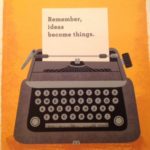 Alicia is a graduate student at Baylor University. She writes for reasons both pragmatic and personal. She became involved in the Waco arts community through In the Words of Womyn – Heart of Texas.
Alicia is a graduate student at Baylor University. She writes for reasons both pragmatic and personal. She became involved in the Waco arts community through In the Words of Womyn – Heart of Texas.
For more information about Autistic women, visit Autism Women’s Network (http://autismwomensnetwork.org).
For general autism resources, visit Autism Society (http://www.autism-society.org) and Autistic Self Advocacy Network (http://autisticadvocacy.org)
Local programs for individuals on the autism spectrum include:
- Heart of Texas Autism Network (http://www.hotautismnetwork.org)
- ARC of McLennan County (http://www.wacoarc.org)
- Baylor Center for Developmental Disabilities (http://www.baylor.edu/bcdd/)
The Act Locally Waco blog publishes posts with a connection to these aspirations for Waco. If you are interested in writing for the Act Locally Waco Blog, please email [email protected] for more information.
References:
American Psychiatric Association. (2013). Diagnostic and statistical manual of mental disorders (5th ed.). Washington, DC: Author
